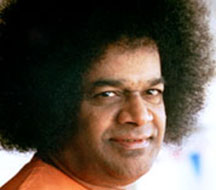
Ego makes one forget oneself
Puttaparthi, Poornachandra Auditorium (Dasara )
Description
In human beings, there are certain reasons that source the emanation of either the bad or the good determinations. No action can be performed without a reason. Reason and result (or cause and effect) are, thus, inseparable. One cannot exist without the other. Therefore, there cannot be any result (or effect) without reason (or cause) in the world. But there is one result which has a free entry, and needs no reason whatsoever! That is Ego (ahamkaram). Ego is very spicy (Chala Karam). It makes a person forgets oneself, causes humiliation to fellow-beings, and instils a superiority complex. These qualities are the greatness in Ego! The person intoxicated with ego would always remain in a state of complacence. An ego saturated person can never discriminate between good and bad. He becomes worse than an animal or even become demonic. In order to drive away ego, we are performing Homam and casting the ego in it (aahuti ). But humanity is not making progress in resorting to the sacred path of divinity.
Topics
-Vices
-
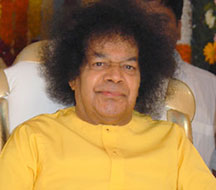
Man is deluded by Money: With analogy
00:01:15One only thinks of money now-a-days. How can money uplift man? Developing compassion or righteousness will elevate man, but on the other hand amassing money will only ruin man. Therefore, man must have money in a limited manner. Swami compares money to the shoe one wears: One can walk comfortably only when the shoe is of the right size; one cannot walk if the shoe is oversized or if it is tight fitting. Similarly man must have money as per his needs. Unlimited money harms the mind, it allures, makes the person intoxicated and ultimately destroys the person. This is not what man has to earn. Man must earn the wealth of good character for only the virtuous ones stand in good stead. One must realize this truth.
-
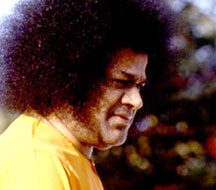
Selfishness is the cause for restlessness
00:00:30It is not that you are unaware of the present day world. People are spending lives full of disturbance, fear and illusion. What is the reason for this? It is selfishness which is hidden and is the basis and root cause.
-
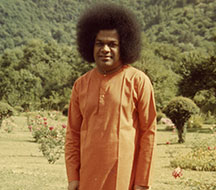
Do not be angry in your life
00:02:25Man is wasting his life due to lack of forbearance. He gets angry every other moment. Anger is the worst of the sins. People though in prayer, use harsh words in a loud voice on others with whom they are angry. There is a person sitting in bhajan who is not giving room for the next to sit. The other person bears it with difficulty and accommodates. But if one gets angry at the other person and says “Shanti, shanti, shanti” in an angry tone at the end of the bhajan, what peace can one achieve? On the contrary, one must consider such a situation as a test and utter the shanti in a peaceful manner. But uttering Shanti in an agitated manner depicts a person without devotion. One with true devotion will maintain tolerance in all situations. Small events also trigger anger in people. They develop hatred and quarrel with each other, thereby, causing agitation and chaos in the surroundings. No, this is not the way. One must be cool and composed. It is one’s duty to strive to make one’s family, and thereby the society, maintain peace. On the other hand it is a gross crime on one’s part to be restless and make the society too restless. Therefore forbearance must be developed as the very life quality.
-
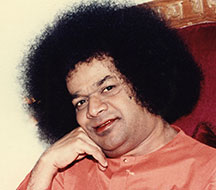
Selfishness is the cause for man's distress
00:01:00It is the quality of selfishness in man that subjects him to many troubles. Selfishness is like a terrible demon. Man will realise and reach the divinity the day he gets rid of selfishness. There is a limit to selfishness too. Man throughout his life indulges in accumulation of wealth and in striving for the happiness of self and of those around him. This is not only wastage of human birth but this behaviour also leads him to the state of animals. Service to society broadens one’s vision and outlook. Man should strive to become broad minded and generous but not petty and narrow minded.
-
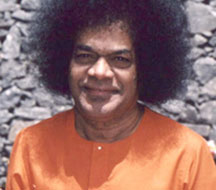
When ego enters the mind, downfall is imminent
00:01:51From the viewpoint of physical strength, Ravana was a very strong person. He had even conquered Kubera and won his wealth. Ravana was a highly learned and scholastic person. He mastered all scriptures and skills. Based on his talents, a sense of Ego, beyond permissible limits, developed from within him. He was a great devotee of Lord Eshwara. But what is the use of such a magnitude of devotion? What is the use of all his fabulous riches? He does not have a moral mind in him. He made himself, thus, responsible for his own downfall and burning of Lanka that has resulted in ashes. Even when an accomplished Scientist sets his foot on Moon’s surface and slips, he is bound to split into pieces. It only means that when Ego enters the mind of a person, his downfall is imminent whether he is a saint or a scholar, or an affluent human being.
-
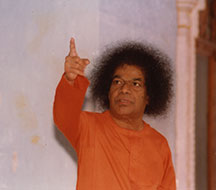
Story of Narakasura
00:05:13Lord Krishna killed the cruel, wicked Kamsa and installed another as the king. This infuriated the wicked Narakasura who tried to conquer Mathura many times. This frightened and terrorised the citizens of Mathura. In order to restore the peace and prosperity of the people of Mathura, He built a village in Dwaraka and brought the people of Mathura to stay in that village. Pragjyothishapuram was the kingdom ruled by the wicked Narakasura. The word “Pragjyothishapuram” is made up of four words namely: ‘prag”, “jyothi”, “sha” and “puram”. When one finds the correct meaning of these words, one can understand that the residence of Narakasura, the Pragjyothisapuram is one’s own heart. The word “prag” means ‘earlier (original)’, “jyothi” means ‘light’, “sha” means ‘to forget’, “puram” means ‘the physical body’. When man forgets his original nature, the “atma jyothi” the “param jyothi” which is his true nature, he dwells in the physical body, which is the “Pragjyothisapuram”. Because of the demonic nature that dwells in it the human heart, the ‘pragjyothishapuram’, has forgotten its human nature. The word “naraudu” means ‘Atma’. All the five elements are found in the physical body of man. Water, being considered as the important of the five elements, is called as “naaram”. “Naaram” also means beings. “Narayanam” means the birthplace of naaram, the beings. “Raha” means non-existence. “Naha” means does not, it also means permanent. Therefore “naraha” means that which is not permanent. The humanity is not everlasting. A being becomes the “Narakasura” when demonic qualities enter into the city of “nara” the physical body. The wicked qualities are sign of demonic nature. When “nara” man, combines with “asura” demon, he becomes “Narakasura”. “Narakasura” also means the one who takes people to hell.
-
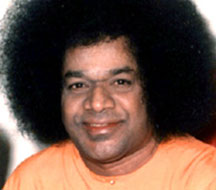
Do not have hatred towards anybody
00:01:17Nityananadam, parama sukhadam Kevalam gnyaana murtim Dwandwateetam, gaganasadrusham Tattwaamasyaadi lakshyam, Ekam, nityam, vimalam, achalam, sarvadhee saakshibhootam Bhaavateetam trigunarahitam Eternally blissful, giver of ultimate comfort, The one of wisdom, one who is beyond dualism, Ethereal, the ultimate realisation of ‘you art thou”, One, eternal, pure, immovable, eternal witness, Is beyond thoughts and is attribute less!! When such bliss is one’s true nature why is man so wicked? It is contrary to human life. Therefore one must always consider that everyone is the divinity in human form. Whomsoever one loves, it is God that one loves. When one greets another it is truly greeting God. Greet and bow to everyone. One must love everyone and hate none. The hatred for others returns to one self as reflection. The hatred that returns as reflection will cause much suffering to one self.
-
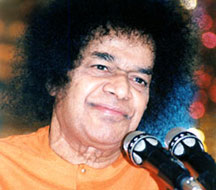
Man's anger and desire are ruining him
00:02:33The desire and anger in man – one is death itself. For the tree, ‘anger’ is an enemy like the root pest. There is another pest bothering the tree, the termites and that is anger. Anger and jealousy together destroy the tree of human life. Today, every man has lots of anger. Affliction by anger leads to many differences. When differences crop up, one only sees hatred everywhere. In daily news one finds the manifestations of anger, jealously and hatred in various forms. Anger and jealousy are the greatest enemies of mankind. There are many planets. Out of those, only two planets are said to be harmful--the planet of ‘anger’ and the planet of ‘desire’. Humanity is ruined because of these two planets. Desires cause more danger to man. Desires must be there, but they must exist under a limit. One must not foster limitless desires. In one moment one is angered, the next moment one feels love- these momentary anger and love are not true. These are the bad qualities that result from man’s habits and the food he eats. One must set a time for everything.
-

Man should transcend three attributes to attain eternal bliss
00:01:42In a split second you become angry. In a fraction of a moment you get agitated. They just happen in no time! This is not the characteristic of Tamoguna but is that of Rajoguna. To depict good as bad and bad as good is the characteristic of Tamoguna. Therefore, man is a fusion of three attributes. So is the world. It means, in a world characterised by three attributes, man with the same three attributes appear. Human being, however, must try to transcend these attributes. Then only you will be bestowed with supreme bliss. It is only when you are able to overcome these three attributes, you will have supreme bliss. How to accomplish is the moot point? One has to obey the command of the divine, follow the ideals set by God, and perform tasks that god likes most. Although divinity is there in all beings, one must develop a vision to view god in a particular form. If one goes by the body feeling only, it is not possible to realize god. God likes your inner feelings and does not bother about outer manifestations. Man likes external appearances but not bother about the inner feelings!
-
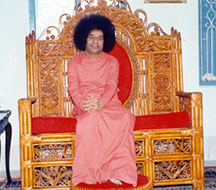
Do not indulge in arguments
00:01:28Let anyone say anything - be peaceful, never argue at any time. Argumentation is not good. Argumentation increases enmity. Never argue anywhere. If anyone says anything, smile. Laughing at them is the true punishment for such people. Paul went on criticizing Jesus, Jesus just smiled at him. The sweetness in that nectarine smile of Jesus transformed the poisonous heart of Paul. So we should put on a smiling face. We should never have a castor-oil face. You may have difficulties and problems, you should resist and face them. Happiness is union with God. Be in the company of God and experience bliss.
-
_1439794035.jpg)
State of messengers today
00:01:24What is the message passed on by the messengers today? Yes, there are some messengers who are passing on the message of God. But many of them are propagating the worldly, temporal, worldly matters. In fact, if he is loved by God, he will never proceed along the wicked paths. Having been the recipient of divine love, he should share with his fellow men this love alone.
-
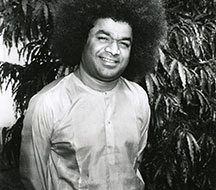
Being bereft of ego would lead you to attain Mukthi
00:02:12There is yet another type of people that want to control and destroy mind. Such people believe that mind is the product of actions and so to get rid of mind they attempt to stay inactive, ‘akarma’. What is the meaning of ‘akarma’? Is it refraining from action? Refraining from action amounts to laziness. ‘Akarma’ means to be devoid of ego. Performing actions bereft of ego is ‘akarma’. Yet another sect of people aspires for ‘mukti’, liberation. Getting rid of ‘Ahankara’ or ego is mukti. Man will be free of bondage once he gets rid of ego. Ego and attachment are self inflicted by man. One must realise that God dwells in all and conduct accordingly. A person may be in the garb of a recluse and go around saying that he is a recluse. But as long as he declares himself as a ‘sanyasi’, recluse, he is not so. Similarly as long as one declares that one is a ‘samsari’ (of the world) one is not so truly. Both the declarations are born out of one’s delusion. One is liberated the day when one frees oneself of such delusions and realise that there is nothing greater than service to others.
-
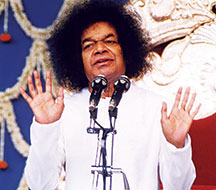
Do not criticize or comments on others
00:03:55One must abstain from criticising the faults in others or their wrong doings. Criticizing others is greatest of all sins and is like a disease that is incurable. There is no medicine for the disease called criticism. Hence criticism of others can be compared to cancer disease. One must refrain oneself from making fun of others, dishonouring others and criticising others. By criticising others one gets oneself immersed in bad intentions. “Dooshanambu Himsa doorambugaanetti, Daiwachintana taanu dandi parachi, Premathoduga taanu prajalanu choosina, Daiwaprema tanaki kaligi undu!!” Distancing oneself form harming and criticising others, Increasing the time spent in contemplation of the Lord, Filling oneself with love for others, Doing all the above will enhance one’s love for God!! Hence one must put in sincere efforts to abstain from harming and criticising others. “Parulatittinantha papa phlambu abbu, Viduvadennatikadi viswamandu, Parudu parudu kaadu paramathmudenaya, Satyamaina maata sai mata!!” One accumulates sin by abusing others, The results of such sin cannot be escaped, Other is not other but the Lord himself, It is the truth that Sai speaks!! The ‘other’, whom one considers as one’s enemy and indulges in abusing and criticising, is in fact the embodiment of the divine self. One must not give place to hatred in one’s heart. One considers another as ‘others’ because of increase of egotism and pomposity. Considering another as ‘other’ is far from truth. Every person is the embodiment of the divine. He is the script writer, director and actor too of the play called world! When somebody criticises, one should think that the Lord himself is doing so for all are His forms. Hence the criticiser and the criticised is one and the same entity. The worshipped and the worshipper are one.
-
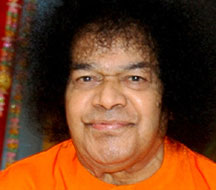
What is Sin?
00:01:50What is sin? As per Indian culture, ‘service to others is merit and harming others is sin (paropakaaraya punyam, papaya parapeedanam)’. ‘Help ever, hurt never.’ Then what is sin? Identifying oneself with the body and resorting to certain practices out of utter selfishness for the comforts and conveniences of the body, There are three words- ‘para’, ‘upa’, ‘kara’. ‘Para’ means ‘Atma’, ‘Upa’ means proximity and ‘Karana’ means doing. Going closer to the atma is termed as ‘punya’ or merit, virtue. Merit means proximity to the divinity. ‘Parapeedanam’ – ‘para’ means God, ‘peedanam’ – forgetting the nature of the divinity is the worst of the sins. Therefore the inner significance is that having faith in the divinity is merit and forgetting the divinity is sin. One should have full faith in the divinity of everyone; then there will be no scope for any hatred or sin.
-
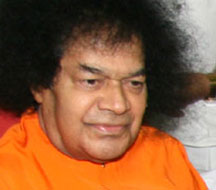
Develop sacred qualities and get rid of animal qualities
00:01:15Embodiments of Love! One must make every effort to know the sacred qualities in a human being. The anger, lust, greed, ego, envy, are not human qualities but animal qualities. Those are not the qualities to be present in humans. It is a beast that causes fear and an animal that fears. Man is neither a beast nor an animal. One should not cause fear nor be fearful. One must transcend these qualities and conduct oneself as true human being. This chief quality must be imbibed by the youth today. One should never create fear in others nor be afraid of anybody. One should have fear of sin.
-
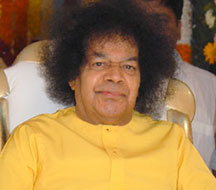
Two common diseases of man are money and position
00:03:44At all times and everywhere people expect from the society. Because of the effect of Kali Yuga, two types of disease are rampant. The first is the thirst for money. In the cities today one finds heavy rush with lots of cars and people bustling about. Everything is business there. Every person is yearning, pining and living for money. Money is necessary; it is needed to a limited extent. Man is becoming irrational and insane because of excessive desires. ‘Manava’ the man is becoming ‘danava’ the demon. The thirst for money has become a sort of madness in man and it is not making man put money to proper use. “....tudaku dongalakitturo doralakauno!!” One is not sure whether the money so amassed will fall into the hands of thieves or others in the end. Man can aspire for money but it must be put to proper use. Money received from the society must be utilised for the society. That is the foremost human value. The second disease is the “thirst for authority or position”. The thirst for authority or power is unquenchable; it is like the thirst that is not quenched even after drinking the whole of Ganges!! Man upon entertaining such madness has converted the world into a mad world. There is no harm in having desire or in having money or in wanting to exercise authority, but all must be obtained in the proper way. One must aspire to command the respect due for one’s position. A cobbler has the same authority in his work as does a prime minister in his work. It is enough if one does one’s duty properly. The differences of big and small must not be entertained as one’s job is great to oneself. One must do one’s duty sincerely. Every man should develop such thoughts. The peace and welfare of the world is achieved when each person is concerned about his own work and strives for perfection in it. People merely chant the sloka “Lokasamastha sukhino bhavanthu” but do not think about the welfare of the world as everyone is engrossed with ones’ own self interests. Man today goes about with narrow feelings. This year is named after “Eshwara”. At least in this year people must strive to develop divine thoughts and engage in one’s duties with compassion and unity.
-
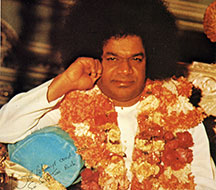
True devotees do not have bad qualities
00:00:56One finds people in the garb of devotee everywhere for if every one of them were a true devotee then what is the cause for the differences and the strife? Where is the hatred, jealousy originating from? No, no. People think that they are devotees but it is their illusion. Everyone must self enquire as to whether one has the perquisites of a devotee. Everyone expects benefits and favours from the society and also from the world. Nobody asks oneself the questions of how one can contribute to the well being of the society or how one can help the world. Hence one must start to help the society.
-

Man's selfishness is the root cause for all conflicts
00:01:12“Ekatma sarva bhootantaraatma”, there is only one spirit present in all the beings. When such broad feelings and thoughts are developed there would be no scope for conflicts. Selfishness is rampant everywhere and is the cause for conflict everywhere. All are human beings, and must know the truth that all belong to the “caste of humanity, religion of love”, and have “the language of the heart”. The five life elements are present in all and hence all are equal. Then why do the differences exist between men? The reason is the loss of human quality in man and increase in the animal tendencies. So, one need not wait for the arrival of New Year. The day when noble thoughts arise in everyone, that day is truly a New Year!!
-
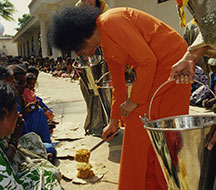
Bhagawan on Jealousy
00:01:12Don’t be carried away by anybody. You hold on to your own faith, cling on to the principle of spirit and atma. Some people are jealous because they watch the prosperity and progress of others and jealousy is one of the worst demons possible. A fruit bearing tree, the fruits are so delicious but you find pests entering into the roots, it is not visible to people but the moment the roots are rotten the tree falls. What is the mistake of the tree? It is only the jealousy, the envy that prompt people to publicize and propagate. It is wickedness.
-
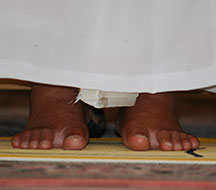
Control your body and mind at young age
00:01:26Your life can be peaceful only when you can control the agitations of your body and mind. These are harmful. If you are not able to control the agitations of your body and mind while you are young, you will not be able to do so when you grow older. When you are young, you have the strength of body, mind and spirit; and if you are not able to control your agitations at this age, you will not be able to do so when you grow older.
-
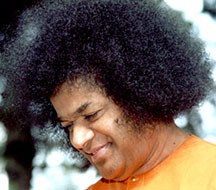
Do not criticize others
00:01:27It is the quality of foolish people to blame others, to cause trouble to others and even to ridicule others. When you blame or trouble or ridicle others, you are doing it to yourself. One can understand this when you we know that the the plant that sprouts depends on the seed that has been sown. Likewise, whatever work we do, the result of that work will come accordingly. For all the the actions in our life, reaction, reflection and resound are inescapable.
-
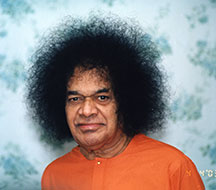
Lack of patience leads to anger
00:02:00Shankara stated that if you have no patience, your anger is fruitless. Such anger is even harmful to you. That your anger, which arises from a lack of patience, helps your unhappiness to grow is also implied by Shankara. The ability to control this kind of anger will come only when you can develop equanimity of your mind. In order that you may be able to acquire this equanimity of mind, you have to make some enquiry. In the third line of the verse, it has also been said that you will have such an ability if you can see the oneness of all the creation around you.
-
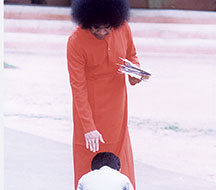
Do not hate anyone
00:02:15That is why Upanishads also have declared, do not hate anyone. Whomsoever you hate or make an enemy, you would have done it towards God himself. Whomsoever you hate or make enemy of would have been extended to God. To whomsoever you offer namaskars it reaches the indweller of everyone. Foolish and unwise people who have not been able to recognise such sacred truths hidden in Indian culture call those people as people who do not know things correctly. The sacredness of Bharatiyas and the uniqueness of the way of life of Bharatiyas and the divinity that is hidden in it cannot be easily understood by everybody. Bharatiya culture which is so sacred and divine has not been understood even by Bharatiyas themselves. Bharat has preached that there could be differences in names and forms but God who is the indweller is common and the same in all.
-
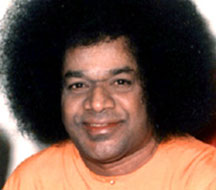
Give up vices to be happy
00:02:37Embodiments of love! As long as there is pride in man, he will not be loved by anyone. The one without pride or ego will be loved by all. The one who is full of anger will never find happiness. Such a person will be continously miserable. The moment he gives up (this trait), when he has full control over his anger, he will be blissful. As long as he has many desires, he will not be able to accomplish anything. The day when he puts a ceiling on his desires, everybody will start loving him. As long as one is full of greed or miserliness , he will never be happy. That day when he moves away from this greed or miserliness he will be happy.
-
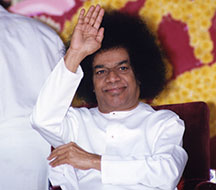
Have control over your speech
00:02:21The faculty of speech is represented by Saraswathi. We should make use of proper words. You cannot speak as you like. You cannot always oblige but you can speak always obligingly. Therefore, we should attach value to our words. If you slip, it doesn’t matter; the slip of the tongue is worse than hell. So you should never slip in your speech. Your words should never hurt anybody. You should ensure that no one would be hurt by your words. That is the main quality of a man. You may feel that it is very difficult. This is a big mistake. It is very easy. Words are under our control. Words dance on your tongue. The tongue has no bone - it can twist in any way. So we should ensure that it works in a sacred manner. Sound is eternal, immortal, ancient and modern, un-polluted and crystal clear. Sound arises from the tongue. God is the very form of sound. God has all these eight attributes, of the movement, of the talk, of the light, of the eternal bliss and of the sound. So our words have got to be sweet. Listeners should be happy to hear you. You must demonstrate your human qualities this way. Truth and love are essential for human life to blossom and manifest.
-
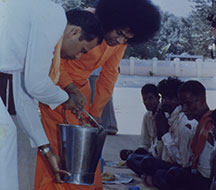
Do not control your vices
00:02:00It is not possible to control your thoughts. Many people make an effort to control anger and envy. This is a big mistake. You cannot control them, you should see that they do not get into you. Make sure that they don’t find a place in your heart. Once they enter, even if you control them, they will come out one day or another. We find the extraction of coal, petrol and oil all over the world. From where did these come? In fact, they were present, but hidden. They are extracted today. Similarly, desire, anger etc. are there within you. When they are hidden in you, they find expression some day or the other. So, make sure that they don’t find a place in you. That is true human value. When anger enters you, trying to control it is useless. Trying to control anger is a sign of weakness. We should never be weak at any point. See that you will never be angry. Then there is no necessity to control it. Embodiments of love! There are so many qualities within man. It is not possible to control all the the qualities which get into you. We should seek good qualities. They arise and manifest, and we should propagate, share and also experience them. This is the true human value.
-

Anger is a sign of your own reflection
00:01:22God does so many activities for several reasons. We cannot understand God’s actions. Men attribute their own ideas and thoughts to God. All that amounts to reflection of his inner being. You think someone is angry with you. It is not his anger. The anger within you is reflected in front of you as other man. Therefore, anger, greed, lust and avarice are reflection of inner being. There is nothing wrong with God, no mistake in Him. God is eternal, immortal, nectarine, pure, unsullied and unpolluted. To attribute defects and mistakes to divinity is your own weakness.
Topics
- Analogies
- Atma
- Attachment
- Balvikas
- Bhaja Govindam
- Bhajans
- Body
- Character
- Company
- Compassion
- Culture
- Day to day
- Desire
- Devotees
- Devotion
- Dharma
- Discipline
- Discrimination
- Doctors
- Education
- Faith
- Festivals
- Forbearance
- Gayathri
- God
- Gratitude
- Guru
- Health and healthcare
- HIS Life
- Human values
- India
- Karma
- Love
- Mahabharata
- Man
- Meditation
- Mind
- Music
- Musicians
- Namasmarana
- Nature
- Parents
- Philosophical concepts
- Pleasure and Pain
- Practice
- Ramayana
- Religion
- Sacrifice
- Sadhana
- Sai Organization
- Saints
- Sathya
- Science
- Senses
- Service
- Sevadal
- Shanthi
- Shirdi Baba
- Society
- Spirituality
- Students
- Thoughts
- Time
- Unity
- Upanishad
- Vedas
- Yoga
- Youth
